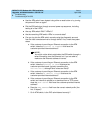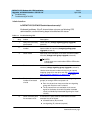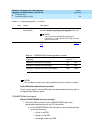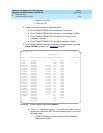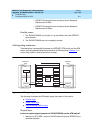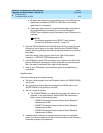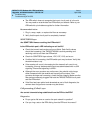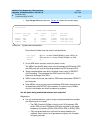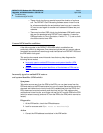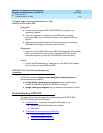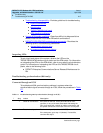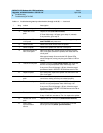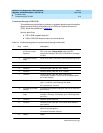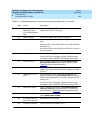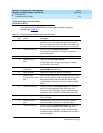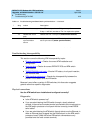
DEFINITY ECS Release 8.2 ATM Installation,
Upgrades, and Administration
555-233-124
Issue 1
April 2000
Troubleshooting
6-15Troubleshooting ATM-CES
6
— These virtual circuits may persist beyond the duration of a phone
call. The DEFINITY Call Processing software saves virtual circuits
for a few seconds after the end stations have hung up in case the
VC can be used again for another call between the same two port
networks.
— There may be other CBR virtual circuits between ATM switch ports
that are not associated with DEFINITY port networks. A common
CBR application is Circuit Emulation, in which T-1, T-3, and so forth
circuits are carried over ATM.
Unusual ATM trouble conditions
A few failure modes in the DEFINITY ECS/ATM switch combination are
particularly difficult to diagnose. One example might be that you cannot make a
completely successful call even though most indications from DEFINITY ECS and
the ATM switch look good.
This section documents some hints and clues that may help diagnose the
following failure modes:
■ Incorrectly typed or omitted EPN route or end system identifier (ATM
switch)
■ Swapped routes, end system identifiers, or fiber between a PPN and an
EPN
Incorrectly typed or omitted EPN route or
end system identifier (ATM switch)
Symptoms
Talk paths are one-way, from the PPN to the EPN: you can hear tones from the
PPN end station to the EPN end station but not vice versa. Because the signaling
channels are bidirectional virtual circuits (VCs) established from the PPN to the
EPN, these can be routed correctly and come up just fine. Talk paths are two
unidirectional virtual circuits, so a single call has one VC from the PPN to the EPN
(which is routed correctly) and one VC from the EPN to the PPN (which cannot be
routed).
Diagnostics
1. At the ATM switch, check the ATM addresses.
2. Look for a cause code 3 (
No route to destination
).
Action
1. Correct the ATM address translations in the ATM switch.



